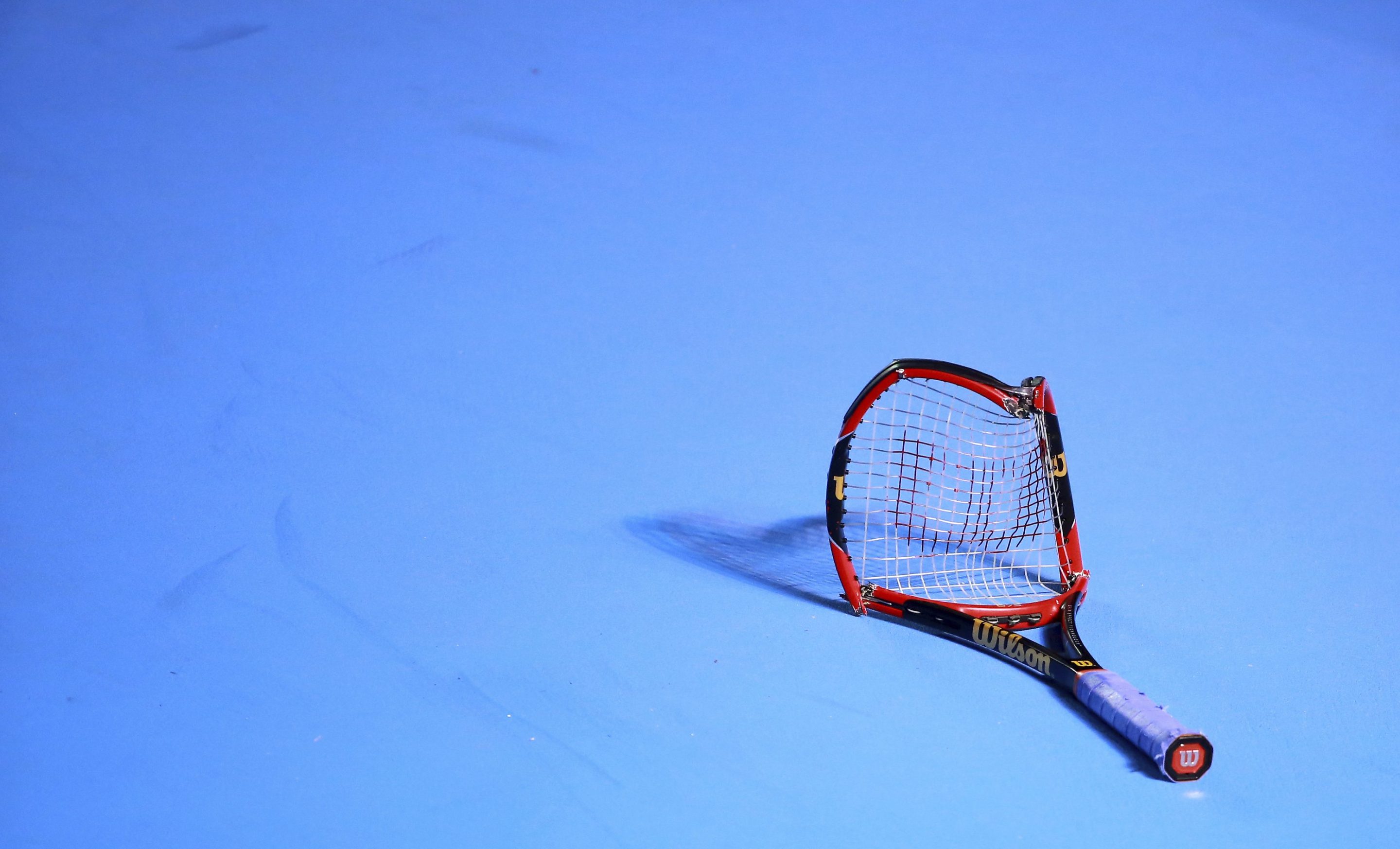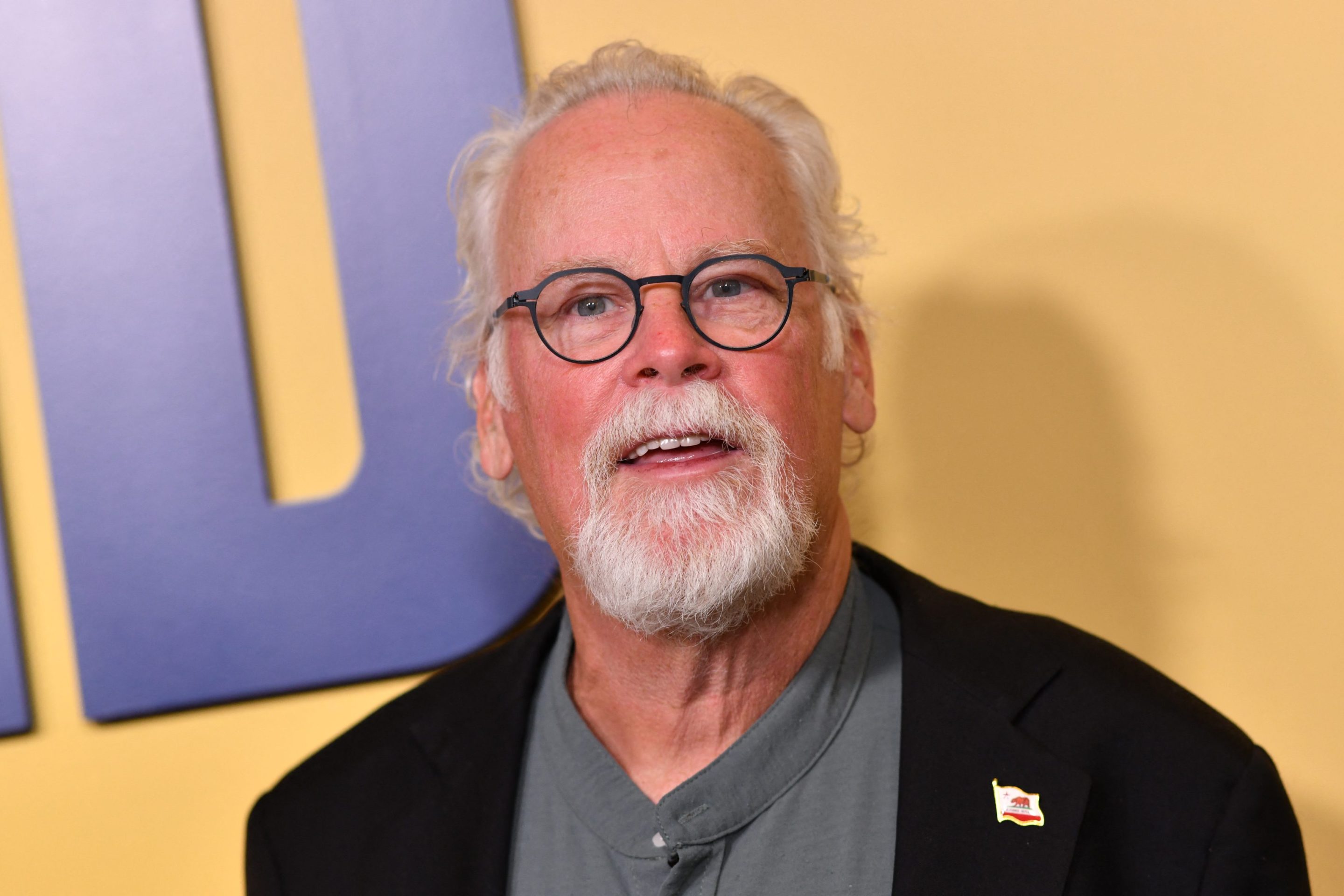The rules governing a tennis serve are pretty vague. You’re allowed to get the ball over the net and into your opponent’s service box in whatever way you want, which is why most people at my level of experience choose to flick their rackets like a hopeful frying pan. A professional serve, on the other hand—a real serve—is a violence of motion, an intention to dominate.
Going for power when you’re not very good at the sport to begin with means you will hit 90 percent of your attempted serves long or see them ram harmlessly into the net like a tuna struggling against a trawler. You will frame the ball and hit it into traffic or someone’s backyard. You will aim instead of hit and thereby defeat your attempted fluidity. Your mind will leave the work to your body, and your body will betray you.
But there is joy in transforming yourself into a thoughtless whip. Feet set, toss high, trophy stance, feet together, racket drop, slight jump, snap elbow, follow through, land forward. You have turned your body into an energy transfer machine. You are a kinetic chain fused for a single purpose. You have uncorked yourself, a top set loose on clay, concrete, grass. Your executive functions have narrowed to a point. The lights dim, your brain goes library-quiet.
Last summer, my brain broke. The mooring between my body and mind snapped and the latter was cast adrift. A friend who had gone through a similar thing years ago described it as feeling like you're on the moon while everyone else is still down here.
Depressive states are nothing new to me, and I find it’s almost impossible to describe them without boring myself. My entire family orders off the DSM-5 menu, which if nothing else makes me feel at least ambiently prepared for whatever games my chemical pinball machine of a brain has in store.
But this was different. I felt unfamiliar to myself. According to a parade of therapists, my dissociation came slowly and then all at once thanks to years of not dealing with my shit. Excavating what exactly triggered my decomposition became the subject for hours of analysis with shrinks I cycled through at a steady clip. I would get frustrated at the lack of progress and my own fear and go off to find someone else with whom to fail.
My history with therapy played a role there: For years as a preteen, I saw my mother’s psychotherapist, who I now realize was there mostly to help me contextualize an increasingly chaotic home life. My mom’s mind had come undone permanently, and I always harbored a fear that my life would just be a really boring rerun of hers. I learned how to say the right things on those couches in those rooms where the clocks were always placed just out of sight. How to tell them how I felt, but staying just inside the lines so as not to arouse concern. How to give them enough to volley back to me. Apparently the term of art for this is “performing.”
Things around me unwound. I got fired from a pretty plum job, where I was told I would be fully supported in dealing with my breakdown as they were shuffling me out the door. My relationships—with my wife, with my friends, with my family—started to strain and buckle as I became a figure that had shown up unannounced and unwelcome. Even the people who wanted to help couldn't because I didn't know what went wrong or how to get it right again. My explanations felt like they came out of a stranger’s mouth. I waited for everyone to leave me.
The first two months of my depression are blurred out, smudged Xs on a calendar. I found some solace in the gym where I would spend hours working out to the point of exhaustion in the hopes that shutting off the higher functions of my brain would give me some relief. The bliss point would always come when I couldn’t remember what locker I’d shoved my clothing into. Autopilot. No need to mourn a lost mind-body connection if you eliminate one part of the equation altogether.
I picked up tennis during COVID, just like seemingly everyone else in New York. Something about the ability to manipulate the flight and bounce of the ball made me fall in love. I wanted my forehands to rise and fall like a parabola. I wanted to turn my slice into a dervish, to reverse the trajectory of this little fuzzy planet and turn its gravity back towards me.
But tennis still felt incomprehensible, like a sport written on a physics classroom chalkboard. Basketball, my first love, was a simple feat of mechanics in comparison. A jump shot had about five moving parts you had to master; the challenge was doing them at a full sprint against other people. Learning to serve a tennis ball—something very much still in progress, I should say—required an unfamiliar level of concentration for me, and the punishment for even the slightest physical mistake was meted out immediately. What I wanted more than anything was that feeling of total control over this tiny object, to make it curl and curve.
I tried to play as much as I could during my crack-up. There were times when I nearly came to tears over playing poorly or losing my serve, as if the barrier between my raw emotional and physical state had vanished. The welling behind my eyes was at least a sensation I could recognize, my body and brain finally reacting to something simultaneously and appropriately.
Every time I did smash a serve down the T I felt totally present. Having emotions—any emotions—at that point felt like a victory, never mind whether I was on the business end of a 6-0 rout.
Presence in my own body. That’s what I was after. The connection between my form and my mind felt like it could fix itself if I could only stay fixed in the moment, my rhizome brain trying desperately to re-root itself. I would try to smash my forehands, rip the felt off the ball, hoping it would clip the tape even though I knew I was trading power for progress.
In September, while I was still adrift, my mother tried to kill herself at a home she rented in Tiburon, a tony idyll that sits across from San Quentin State Prison like a trick mirror. This was her fourth or fifth attempt, I think; each time my brothers and I would wear dark humor like a heavy blanket, whispering to each other if she was finally serious about it. For whatever reason, I felt galvanized by the calls in the order they came: the police, the hospital, her psychiatrist. I leapt into action, looking for inpatient facilities who would take her in for a month, trying to figure out if she had the money to pay for a bed in a private facility where she could be supervised and made right again. I went out to California to see what I could do from the ground. I watched Everything Everywhere All At Once on the flight over. Yes, you can laugh at that.
By the time I got there, my mother had decided she didn’t want my help. She denied that the attempt had even happened, made the maudlin claim that this was a plot by her kids to lock her away and chow down on an early inheritance. This had happened so many times—an attempt on her own life, a rush to help, a stiff arm—that I started to wonder whether my memory was faulty or, worse, if my own reality was glitching. What if she was right? What if none of it had been real?
I stayed in Oakland for a week anyway, sitting in an apartment up the hill from Lake Merritt, a few minutes from my brother. Packs of Marlboro Lights. Seeing my nieces. Drives to Point Bonita where the seagulls looked like brushstrokes. Thin as curves, like Annie Dillard said.
When I came back to New York, I didn’t feel particularly attached to anything. I blew like a draft through familiar places. My mom’s psych called me a month later. Apparently my mother had moved down to Orange County in the middle of the night a few weeks before and had now locked herself in her apartment, paranoiac shadows closing in on her. The psych asked me to call in a 5150 and I did, dialing the number for Orange County police and stumbling over the description of what exactly was happening. I don’t recommend talking to the police generally, but if you can avoid it being about your mother’s potential suicide while you’re totally dissociated, that’s probably for the best.
The cops showed up to her door half an hour later, only to call me and ask why I had phoned in the emergency from 3,000 miles away when my mother was perfectly fine, pleasant even. She didn’t know why her estranged son would have done such a thing, but he’s always been troubled. So it goes.
Since I was a kid, I have been profoundly aware of my body. It’s come in a lot of shapes over my life; I was fat until I was tall, skinny until I was big, lean until I was soft. I still try to make myself small on flights, desperate to take up as little space as possible, trying to fold myself inwards over and over again.
Alongside that awareness was a constant disappointment at what my body couldn’t do. I had literal dreams about driving down the baseline, loading my feet, and dunking with an easy hop. In reality I would spend hours in the gym clumsily jumping, my right hand rubbed raw from grabbing a handful of orange rim and none of the air above it.
Spending months outside that awareness—even in depression’s diving bell—ended up rewiring some faulty connections. Part of getting older is understanding that your body is in a constant state of slow decomposition, both in form and abilities.
If you’ll allow me to spout the eternal wisdom that 12-step programs turned into brochure copy, part of being happy is shrugging your shoulders at entropy, counting forward because that’s the way time moves. My 35-year-old body cannot do the things my 25-year-old body could, and my 25-year-old old body couldn’t do the things that I wished it would. We struggle against the impulse to control and dominate our own forms. It feels good to accept things as they are.
I came to sometime in December, a spontaneous resolution that came on with all the urgency of a plot hole. It’s difficult to explain to people that you woke up back in your body one morning, wondering why they’re upset and angry and confused about the last six months. Apparently I hadn’t just disappeared from existence, which was news to me.
My tennis habit has stuck. I play anywhere I can: on the mint-colored clay under the inflatable circus tent at Prospect Park, half-frozen in February on the Leif Ericson courts in Sunset Park, the first spring days on South Oxford, navigating the cracked slope of a baseline trying to avoid tearing my ACL. I'm still no good, but I’m learning that not every strike has to be perfect, not every serve needs to be rocketed down the T to feel good. Tennis reminded me that I even had a body. That it could do anything should be enough; that it can sometimes do what I want is a victory.






